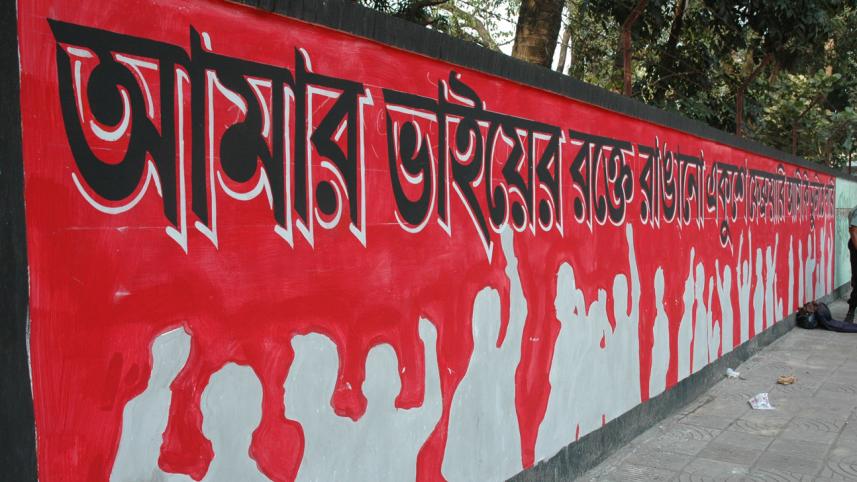EKUSHEY ON MIND

1952 was 64 years ago; today's youth is somewhere around the third generation of the Language Movement activists and martyrs. Still, the spirit of the day -- now recognised as the International Mother Language Day by UNESCO -- lives on. How? It is said that one of the biggest powers of any form of art is that it can encapsulate the feelings and thoughts of a person or a community of a particular time, and carry it on for as long as it exists.
“Amar Bhaier Rokte Rangano” is undoubtedly the most iconic piece of creativity on the Language movement. Originally written as a poem by Abdul Gaffar Chowdhury, it was first put to tune by Abdul Latif, and later given its current tune by Altaf Mahmud. Abdul Latif's “Ora Amar Mukher Bhasha Kaira Nite Chae”, Shamsuddin Ahmed's “Rashtrobhasha Andolon Korili Re Bangalee” and the first song on Ekushey composed by Mosharrafuddin Ahmed on February 24, 1952, “Mrittuke Jara Tuchcho Korilo Bhasha Bachabar Torey” -- remain just a few of the many powerful songs written and composed at that time.
Due to the sensitive nature of the movement and censorship worries in the political context of the country, it was difficult to make a film on it. Young Zahir Raihan, an active participant of the Language Movement, dodged all of it to direct a striking symbolic depiction of the country's struggles through his film “Jibon Theke Neya”; probhat-feri and other observations of February 21 were also captured on film for the first time through it. The use of songs like “Karar Oi Louho-Kopat”, “E Khacha Bhangbo Ami Kemon Kore” and recitals of Tagore's “Udoyer Pothe Shuni Kar Bani” made for one of the most complete films on Bangladesh's spirit of liberation.
Countless poems have been written against the backdrop of the movement; from the most prolific of wordsmiths to the average amateur, almost everyone who has seriously practiced poetry has written something on Ekushey. Mahbub-ul Alam Chowdhury's “Kandte Ashini Fashir Dabi Niye Esechi” was one of the first poems written on the movement. It was banned by then government, and the publisher of the poem was arrested.
“Bornomala, Amar Dukhini Bornomala” and “February 1969” by Shamsur Rahman, “Amake Ki Malyo Debe Dao” by Nirmalendu Goon, “Chithi” by Abu Zafar Obaidullah and “Shobhyotar Monibondhe” by Syed Shamsul Haq are the other poems that have stood the test of time, and still evoke the spirit of the movement that earned us our right to talk, sing and write in Bangla.



 For all latest news, follow The Daily Star's Google News channel.
For all latest news, follow The Daily Star's Google News channel.
Comments